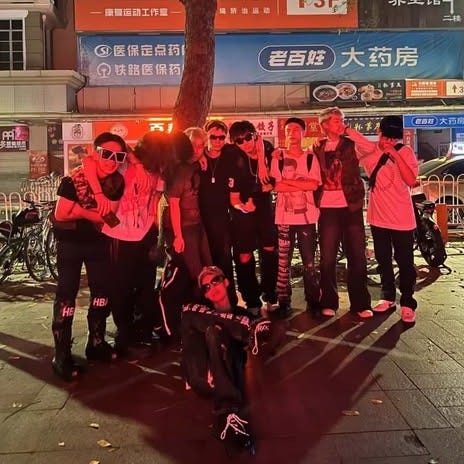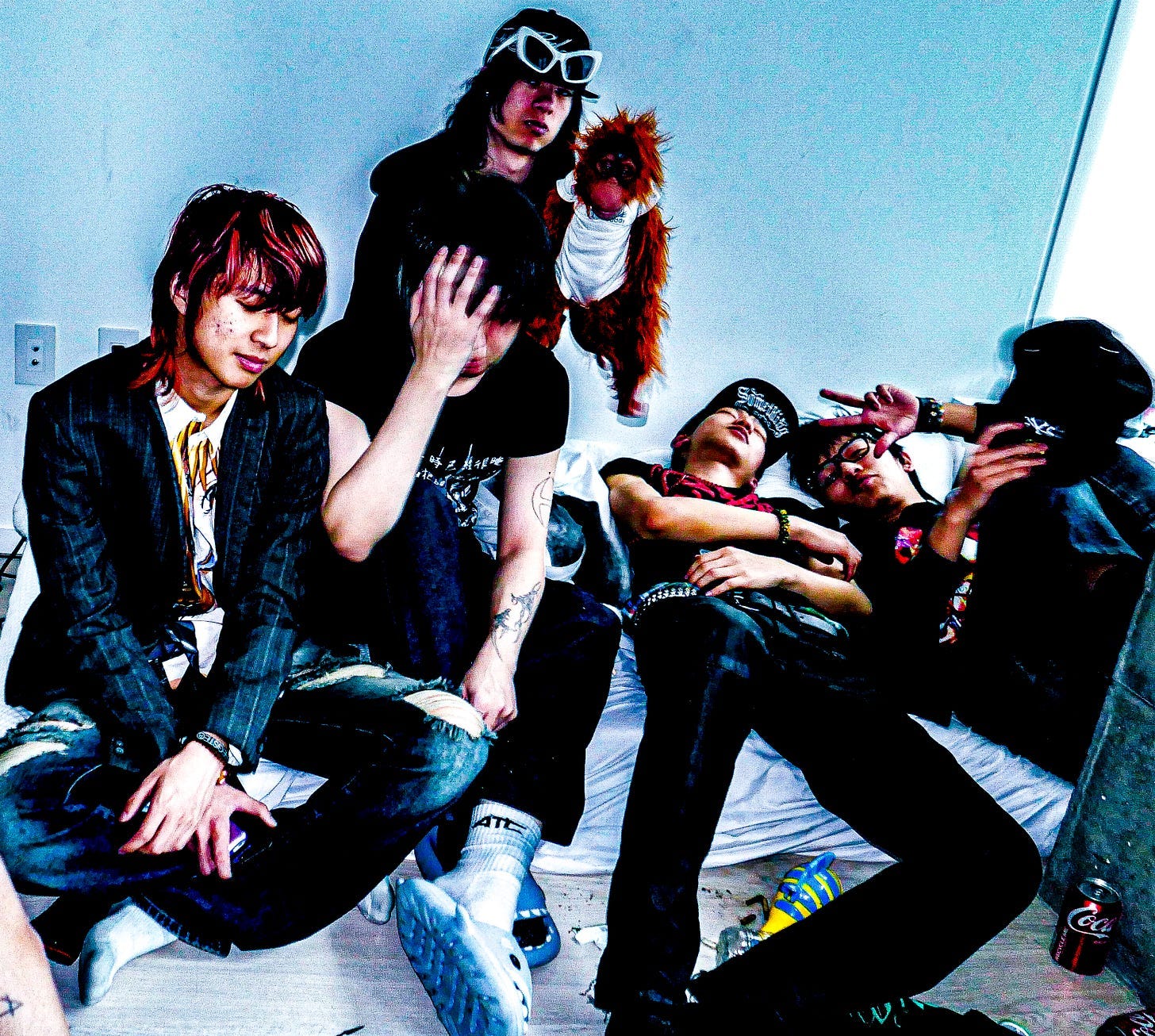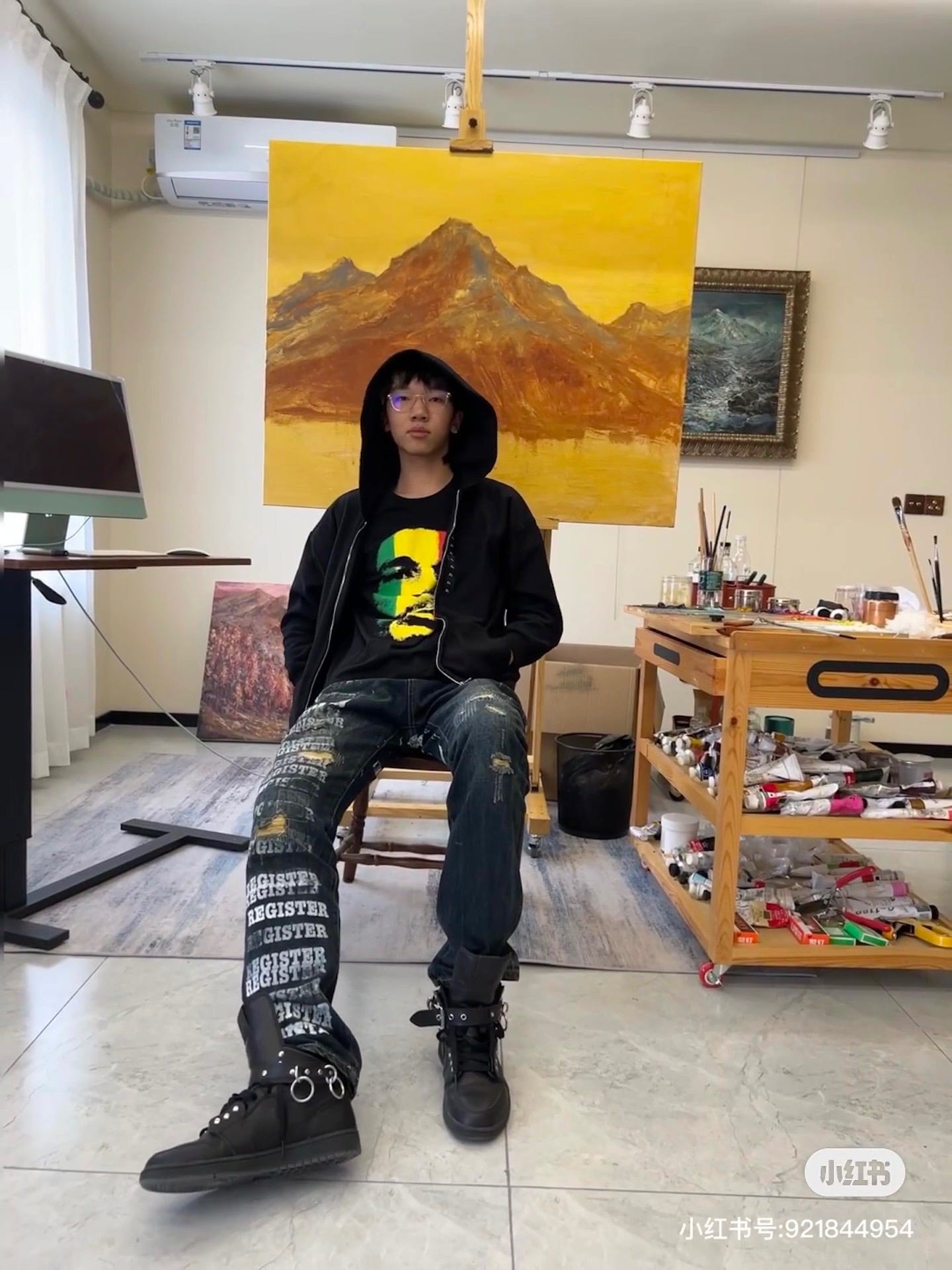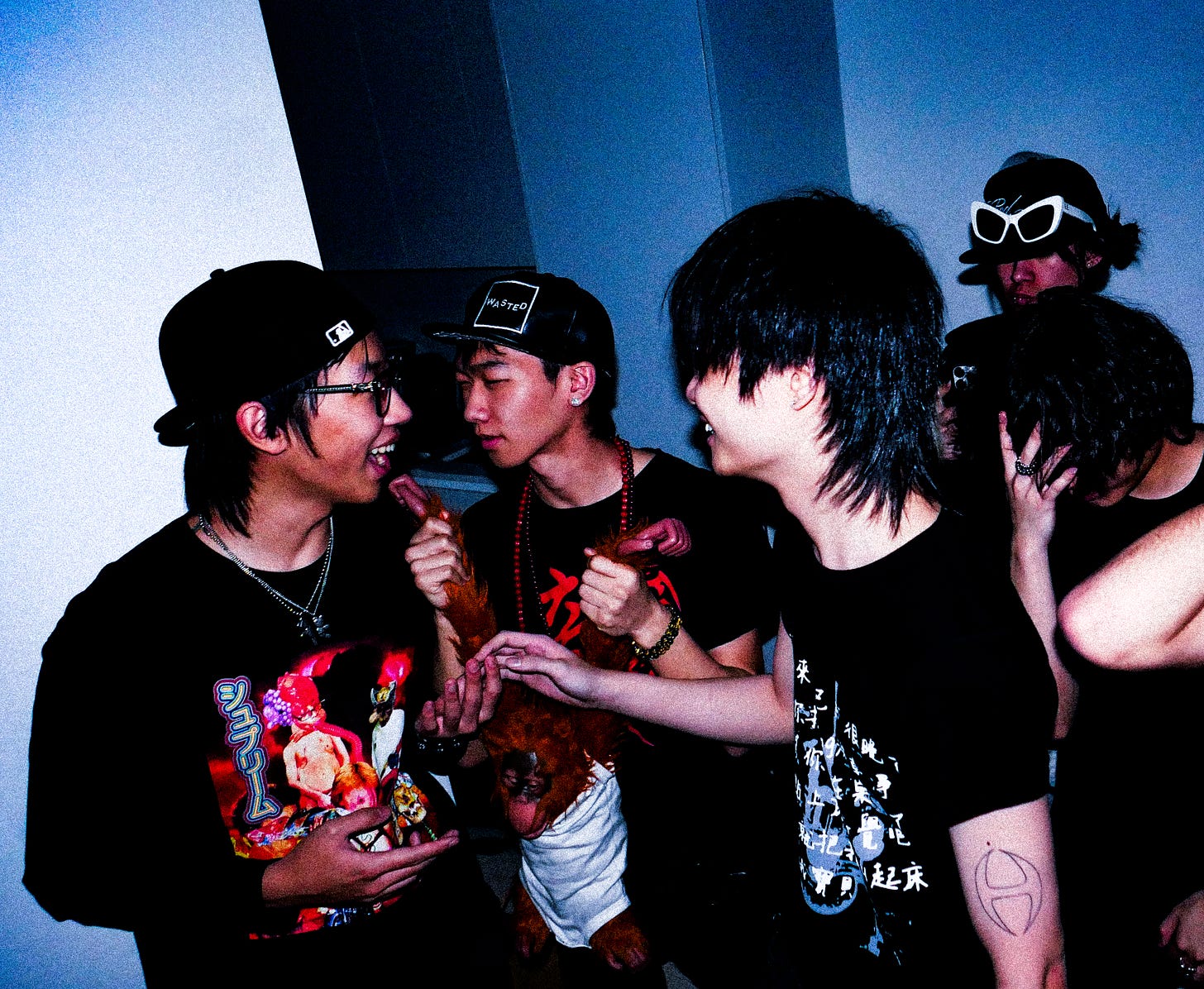Human Register: The New Faces of China's Hip Hop Scene are Not Underground, But Above the clouds
An introduction to China's budding rap scene and one of its groups from various artists and contributors to the culture
“What if we are not underground, just flying so high above the clouds, that they cannot see us yet?”
When artist Lan played me one of his unreleased tracks, 暂停(Zàntíng), I admittedly had no idea what the song was about, as all the lyrics were in Mandarin, which I know very little of. As I listened to Lan’s melancholic vocals echo and seep into an ethereal trap melody, I got the sense that he was issuing a beautiful farewell of sorts. But what was he lamenting, and why did it sound so fire?—I instantly needed to know.
It turns out, Lan was mourning his lack of substantial adversaries in terms of his own swag. “The song is called Pause,” he says. “Basically, I’m saying that I’m so far ahead, and you are so far behind, you are paused. So, you want to stop time, and pause me so you can catch up.”
The lyrics at the end of Lan’s last verse are as follows:
他想时间暂停 这样就能赶上我
但他不能暂停时间 所以只能看着我
她想暂停时间 这样就能跟着我
但她不能暂停时间 只能想着我
(He wants to stop time so he can catch up with me. But he can’t, so he can only look at me. She wants to stop time so she can follow me. But she can’t, so she can only think of me.)
The plight of having so much aura that the majority of people cant even come close to the vision is one that Lan shares with his friends and collaborators, most of whom belong to a music and fashion design collective by the name of Human Register. Many of them are lounging coolly on a twin mattress on the floor of a stark Brooklyn apartment as I'm talking to Lan. Right now, they all seem pretty relaxed, but don’t get it twisted—the group's image and sound are progressing at a rate that won’t pause for anyone to catch up.
They’re here for the afterparty of a friend being sent back to his home in Chengdu in a couple days due to visa complications. The sun is set to rise in a few hours, people are on various combinations of substances, and the emotion in the room is as palpable as the steez. The members of Human Register sport snapbacks pointed in various directions and flashy graphic tees with Chinese lettering on them. They look like alternate skins of the same character slot in a street-wear aesthetic 2D fighting game; each member’s swag is amplified tenfold by their presence as a group.

All hailing from various parts of mainland China, most of the HR team today met online in 2020 on what I'm told is the Chinese equivalent of a Playboi Carti subreddit. Since then, they’ve recently started to gain a bit of traction in China from their first official collab, HR Tape (2023). Many members agree that the tape is unpolished—less of a cohesion of their sounds, and more of a selection of tracks from each artist highlighting their individual styles—it’s an eclectic mix of grimier trap beats and dance/electronic tracks. The tape is very raw, but the talent and the vision is there. Since then, the HR team has been honing their artistry individually and as a group, gradually unveiling a unique sound and style: acting as a microcosm for the current state of Chinese underground hip hop.
“Back in the days when HR just popped up in the China underground scene, everyone was hating because we was doing something they cannot understand,” says Taco, founder of Human Register. “That made our fanbase very solid, know what I mean? People who fuck with us, they fuck with us instantly.”
Taco’s namesake(which stems from a meal made by his old host family in Australia) was originally his editor handle when he first stepped foot into the hip hop scene interviewing underground rappers and producers for a WeChat page called TrapCN. These days, TrapCN hosts events in cities where the scene is prevalent (almost exclusively Shanghai and Guangzhou), and has booked Human Register’s largest show yet in Guangzhou last July. Since Taco’s transition from reporting on music to making it, his name has been appropriated to stand for “TRY AGAIN CULT ONLY”. Taco and many of his friends are fans of the “cult classic” film aesthetic from the late 90s to early 2000s, specifically Hong Kong based crime thrillers starring Anthony Wong. This inspired him and others early on to try and build a cult fanbase of their own with a group called Cult Members Only.
These days, Taco aspires for more than his current niche audience. He recognizes that there is a line that can be walked between the underground and mainstream sound, one that he hopes can one day be more blurred in China as it has become in America. He tries his best to “Stay authentic, maybe sometimes take some advice from the mainstream audience too—[be] humble, open to suggestions.”
Taco - Nvrsl33pgangP4 (Official Music Video) - bilibili
“As Chinese men, we don’t share our emotions that much, even with our friends. Since making music like this we’re kinda more outgoing—it’s like changing our whole personality.”
Taco isn’t ashamed to admit that he takes inspiration from other artists so long as his lyrics are truthful to his own emotions. It’s common in China and the US alike for kids to emulate their favorite rappers over YouTube “type beats” when trying their hand at making music, and every Chinese artist I’ve spoken with has been transparent about going through this phase before taking their craft more seriously. Members of the group and fans alike have started to recognize an increase of quality and authenticity in terms of what HR puts out since their main “type beat” era, however. Human register has added their own producers to the roster since its founding, and more and more of its artists are trying their hand at producing their own tracks. In addition, Taco is proud to see he and his peers starting to derive their lyrics more and more from their lived experiences.
“The emotion we put into our songs is kinda different now. it really relates to our life experience,” he says. “Hoozie and Chinglish, they really changed their style when they started their college life, like their lyrics started becoming more emotionally aggressive. We kind of all accept it and let the music become an outlet, because as Chinese men, we don’t share our emotions that much, even with our friends. Since making music like this we’re kinda more outgoing—it’s like changing our whole personality.”
“In China, underground is like nothing. It’s really underground.”
In a scene largely founded on western SoundCloud rap influence where artist “clones” run rampant, there has been a recent spike of Chinese artists going through similar transitions as HR and finding their independence. To be fair, the art form hasn’t had much time to blossom yet—even the concept of classic lyrical hip hop in China is a relatively new one. its introduction to the general population is synonymous with the release of the popular rap competition show, The Rap of China (Zhōngguó xīn shuōchàng), which first aired in 2017, and the concept of less lyrical, more trap centric “underground” music is newer and niche-r still. As Taco puts it, “In China, underground is like nothing. It’s really underground”. The gap between mainstream and underground hip hop has started to shrink, but it prevails. Shangdong native Hoozie of Human Register doesn’t currently see the two scenes merging as much as he does people switching from one to the other:
Hoozie - H lifestyle (Official Music Video) - bilibili
“None of the mainstream rappers are doing like, crazy shit right now. All of them, their prime era is all in the underground,” Remarks Hoozie. “They are too fucking different. Mainstream listeners, they just don’t understand shit. But underground listeners, they just listen to underground and don’t give a fuck about mainstream shit. It’s just like, two separate audiences. If you want to make money you have to do mainstream shit—those underground people won’t listen to you anymore.”
Taco, Hoozie and Chinglish all aspire to popularize their own sound, but when I spoke with the latter two, it was clear that they had a different view point on what determines their style of music. While Taco is transparent about occasionally following trends, Chinglish, (who chose his name as a way to re-contextualize the negative connotations of the word used for the broken english many Chinese people speak) and Hoozie (an American appropriation of his Chinese name) both claim that the popularity of a sound makes no difference in whether or not they use it.
“I just want to stay in my lane,” states Chinglish, who hails from Jiangsu. “A lot of mainstream rappers flop because they really do try to make money. But I’ve never thought about it like that, using music to get money and shit. That is not our goal.” Both artists claim that they’d like to take a more experimental route with their upcoming releases. Having attended high school in Beijing together where there is not much of an underground hip hop presence and being heavily inspired by each other as a result, they each fill a similar niche within Human Register. Hoozie is known for his unconventional flows, and Chinglish for his unique drum patterns, now that he has started to self produce. Chinglish also produces for other prominent artists in the scene under the name Lil China.
Another change taking place in the scene is the language in which lyrics are delivered, which Chinglish, Hoozie and the rest of HR are becoming prime examples of. One effect of Chinese rap culture being founded on US influence is that the current industry standard is to rap in a mix of Chinese and English, but artists have now started to write more in their native tongue, many transitioning to writing in fully Chinese.
Chinglish - takemyhand (Prod. DAMNLIFE) - bilibili
“right now, I think, if you add Chinese in your song It goes harder than English cause it’s our own language.”
“All the biggest underground rappers in China, They rap in English, but there are some of them, they only rap in Chinese,” says Chinglish. “So that's different to me. Because I'm Chinese, I can understand Chinese more. So when I listen to Chinese, I really can feel it.” Taco expands on this thought:“We don't tell lies. We don't rap-cap in Chinese, because it's so apparent to Chinese people. So the Chinese words, we put 10,000 times more effort in those.”
The average Chinese trap star—Hoozie for example, would tell you that it’s easier to write in english, as artists are able to choose from an abundance of stereotypical American rapper themes to take inspiration from without being scrutinized for a lack of truth or substance in their lyrics from their (near if not fully native Chinese) fanbase. On top of this, popular Chinese streaming services like NetEase censor any lyrics deemed undesirable: references to sexual content, violence, drug use etc., so those who are looking to create a more explicit sound are often able to fly under the radar of censors using English lyrics. Despite this, artists who wish to expand their lyrical capacity for authenticity and introspection are naturally finding themselves doing so in their own language, giving themselves a leg up against their English-rapping counterparts.
“right now, I think, if you add Chinese in your song It goes harder than English cause it’s our own language” says Hoozie. The myth that rapping in English is necessary to gain global traction as a Chinese artist is being rapidly debunked with the recent success of a few artists in the scene, namely Bloodz Boi and jackzebra: two cloud rap artists from Beijing and Shanghai who have reached international audiences, both of whom Chinglish and Hoozie credit as inspirations. In order to gain a better perspective on Chinese experimental hip hop reaching western audiences, I spoke with Human Register affiliate and Chinese hip hop expert Jincheng Zhou, known informally as ginseng.
“The crowd was fucking hype. 99% of people don’t understand Chinese.”
ginseng runs an underground music page/community mainly focusing on Chinese artists by the name of ginsengmuseum on Instagram, Rednote and TikTok. He is currently located in Irvine, CA, and is excitedly recalling his experience at jackzebra’s show at UCLA on April 25th of this year a few days ago. The show took place in a UCLA frat house and featured a lineup of established American underground artists (Deer park, Harto Falión, kuru, lor2mg and Lucy Bedroque) who opened for Jack, many of whom are affiliated with NYC based underground collective Surf Gang; which Jack has recently signed to. ginseng was able to spend some time with Jack and other underground names like Surf Gang producer and co-founder evilgiane through a mutual friend. He describes the show as a truly unique experience:
“The crowd was fucking hype,” he says. In reference to Jack’s previous shows, ginseng is sure that “It was 100% the most lit”, despite the fact that “99% of people [didn’t] fucking understand Chinese.” Since gaining traction recently outside of China from going viral as a “Chinese Bladee”, jackzebra has solidified his own sound and cultivated a unique fanbase for an artist who’s lyrics are all in Chinese—one that is largely American. Jack’s lyrics speak to the apathy of Chinese youth that is fostered by academic pressure and corporate culture, among other uniquely Chinese societal issues—he is a testament that rawness surpasses relatability for American audiences. He’s a hometown hero of sorts for ginseng, who’s neighborhood in Shanghai is only a hop skip and a jump from Jack’s. “As a Chinese, we hella proud of this kid,” he says.
jackzebra at UCLA on 4/25/24 performing 硬碰硬 - Shot By ginseng
While many see jackzebra and Bloodz Boi’s progress as boundary-breaking for their own respective careers, Taco believes that there are thresholds that they have yet to cross as Chinese independent artists, such as the rise in popularity of a group like HR (as opposed to an individual). He feels that Chinese underground hip hop in its novelty still lacks proper seasoned veterans who are willing to carve a path for less experienced artists looking to advance within the scene. This is a role he would like to take on someday:
“We are missing a tutor, a teacher, you know what I mean?,” Taco remarks. “HR are just a group of kids that met each other online, all WeChat groups.” As Human Register’s founder, Taco tries to prioritize the group's success over his own. “I’m trying to [help Human Register] become the first people who pop out, like, in the middle of mainstream and underground, who can really introduce our team. For my shows, I try to bring the whole team’s awareness up. I say “it’s HR T-A-C-O” every time to the camera—it’s Human Register,” he says inevitably.
“The problem is, not everyone tapped in like that. And not everyone fuck with the new shit too,” Says Taco. Chinglish, Hoozie and Taco all agree that performing at larger shows is a tradeoff for them at the moment:
“Our first show was very small,” Taco recalls. “Like, 60 people, 20 of them are our friends. We were just vibing, enjoying our music. It was really happy, but when the shows get bigger and bigger, the crowd gets like—fewer and fewer people who know us before.”
“I think we were the first underground group who went on that show,” Chinglish says, in reference to Human Register’s TrapCN show last summer with fellow underground collective Virtual Adam. “I don’t like the big live shows. Not for now, I think. I like small parties more—It’s more turnt up.”
“That gave us a lesson,” echoes Hoozie. “I think we shouldn’t be too rushed.”
Despite the mixed reception the group gets sometimes, Taco always welcomes the opportunity to introduce the team to a new demographic. “There’s always a group of fans that we can see below, like, they know every lyric, they know everything. I’m just frustrated and grateful at the same time. With live music, people are more open,” he says. “I just think, if the crowd don’t fuck with me, they gon’ fuck with me. Like, they don’t know me, but after this show, they knew me.”
Human Register and Virtual Adam onstage in Guangzhou on 7/6/24 performing Topless - Taco, delphia! - bilibili
In spite of having an already loyal fanbase, Taco along with other members of the collective are transparent about their occasional frustration with the fact that you don’t always reap what you sow when it comes to their field; It’s common for them to receive hate and negativity as rappers. Even rapping for a mainstream audience is not typically a respectable (or lucrative) profession in China, and catering to a scene as an independent artist bares even more challenges.
Taco grew up in Beijing, a place where new age rap is not very popular. As a result, he takes inspiration from the city’s hand in originating punk rock for the country in the 90s, with artists like Cui Jian, and bands such as Brain Failure and Underbaby. “They really made their name, whether they was popping or not popping back then,” He explains. “Now they are making the histories. Like, we all remember them well.” Since he was born, Taco has always been around inspiring art— his father is a painter who frequently makes the 38 hour trek by car from Beijing to the Tibetan mountains to paint them; Taco has accompanied him once before. For Taco, art is about sacrifice. He recalls a quote from a Chinese rockstar (he’s not sure which one), that loosely translates to “real rockstars burn themselves”.
RedNote ID:921844954 - RedNote
“Everyone’s kind of sacrificing ourselves to help the scene, help the culture, to make good music for our audience to listen to and to feel something, feel alive,” Says Taco. “Me and Lan, we always talk about that. Like, we get sick, sometimes we feel bad, like we don’t sleep, it’s fucked up. And we have to deal with the school shit too, like, hav[ing] so much stress and pressure and nobody can share.” (Taco is currently a student at Syracuse, and Lan at NYU). But the members of Human register don’t feel like failures by any means, in part due to the success of their clothing line.
Taco is excited to talk about Human Register’s streetwear brand, which is heavily advertised on their socials (the clothes can be found at humanregister.online).“Me and leadest, every day, we talk about how to bring HR’s music and clothing line together. The solution we got right now is to have parties showing the clothes, and making exclusive clothes you can only get at the parties,” Taco says. He goes on to explain that not only are the clothes (which member leadest designs) more profitable, but also serve as a more tangible measure of the groups success: “[leadest] can see his revenue every day, like, is this season selling well? Is that season selling not good?,” he says. “He gets good feedback, and he can actually change his plan. For the music, it’s not like that. Like the feedback you get negatively affects you.” Taco attributes the music as a source of the brand's success, and vice versa: '“Rappers like us, we don’t get much streaming revenue, so how are we progressing? What leadest has done is like, he’s helped us a lot for the music. We get merch collaborations, design stuff, music video visuals…” Each member's fashion is a big part of the image they want to present to the world.
@humanregister on Instagram
“If you’re a fashionable person, I think your music will sound better.”
“I’m just trying to show my listeners me,” Says Chinglish. “Like, it’s a whole web. What I'm wearing, what music I make, my visuals, how I talk.” Right now, Chinglish is wearing a t- shirt with the word CUNT spelled out in rhinestones. He says he got it in a tourist shop in LA.
“If you’re a fashionable person, I think your music will sound better,” says Hoozie. Hoozie dresses how I would imagine one of the main characters in a Chinese reboot of the cult classic British teen drama show, Skins (2007). He is a Fashion design student at Parsons School of Design, and Chinglish currently attends the School of Visual Arts.
If Human Register is miles ahead of any artists in particular, it is themselves from just a moment ago. Many members, along with other artists in their circle are making rapid strides in their own fields, some, like Chinglish and Hoozie, no longer fully identifying with the image or sound they currently portray. Most are confident that they are sitting on a sonic mountain of unique content of which the general public has never heard the likes of, honing their ability until the time is right. While you could accurately describe their sound as underground, artist Lan says he prefers a different term.
“What if,” Lan says, “We are not underground, just flying so high above the clouds, that they cannot see us yet?”





